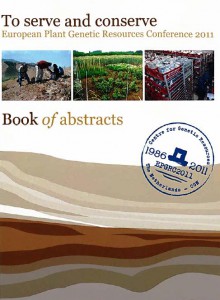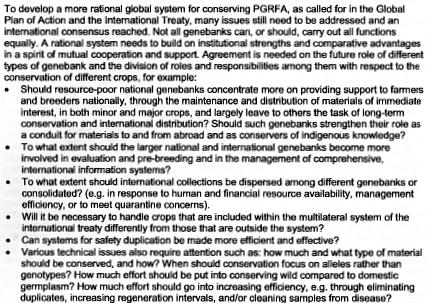 We’ve managed to get our sweaty little hands on the volume of abstracts 1 of the Eucarpia To Serve and Conserve conference, which has just ended in Wageningen. No time to digest the contents fully yet, but to stimulate your appetite, here’s part of the abstract of Geoff Hawtin’s paper, which asked: “Whither Genebanks?” Some provocative questions in there.
We’ve managed to get our sweaty little hands on the volume of abstracts 1 of the Eucarpia To Serve and Conserve conference, which has just ended in Wageningen. No time to digest the contents fully yet, but to stimulate your appetite, here’s part of the abstract of Geoff Hawtin’s paper, which asked: “Whither Genebanks?” Some provocative questions in there.
VIR’s Pavlovsk Research Station in the snow
VIR’s Pavlovsk Research Station, a set on Flickr.
Still all to play for at Pavlovsk.
Nibbles: Barley genetics, CCAFS, VIR, Gardens of Adonis, Traditional Knowledge, Safety duplication, Wild pig,
- 10MB worth of proceedings of the Barley Genetics Symposium from ICARDA.
- So, what will this CCAFS do anyway?
- Russia offers VIR to the world. Again.
- Adonis, Sappho and lettuce, all in one post.
- Modern science needs traditional knowledge. And a fish needs a bicycle.
- Global Crop Diversity Trust and Latin American genebanks team up to rescue another bunch of crops: coffee, tomatoes, chillies, beans, squash etc.
- The world’s smallest and rarest wild suid is cute enough, not as cute as pocket pigs.
Nibbles: Lupine, Methane, Food crisis, Nutritionists, Carrots, Poi, Barhal, Mung bean, Invasives, European bison, Mango
- Saving the scrub lupine. Well, it’s a crop wild relative of sorts.
- Dietary approaches to reduction of belching. No, not less beer and peanuts in front of the TV.
- “Governments and institutions should strongly promote new agricultural technologies suitable for smallholders through increased investment in crop breeding and livestock research.” That would be IFPRI on the actions needed to prevent recurring food crises. Hope that includes supporting the genebanks.
- “Can’t nutritionists make up their minds? They keep changing things!” Nuff said.
- Carrots are exotic? In Canada? Yes indeedy.
- Rachel dissects the cost of proper poi in Hawaii.
- Behold Barhal, relative of breadfruit.
- High yielding mung-bean repatriated to Somalia. Genebanks protect and serve?
- Do your bit for conservation, eat an invasive. Or, perhaps, a bison?
- Bad news for Indian mangoes. What I want to know is whether there are any varieties that are doing really well.
- Mediterranean forests going up in smoke. Bad for the crop wild relatives in them too, no doubt
To Serve and Conserve
That’s the title of the European Plant Genetic Resources Conference 2011, organized by Eucarpia, and on right now in Wageningen. Are you there? Can you tell us about it? We would particularly like to know the answer to the question “Whither genebanks?” asked by our old mate Geoff Hawtin. Oh, and here’s a note for the organizers: our blogging and twittering services come quite cheap.






















